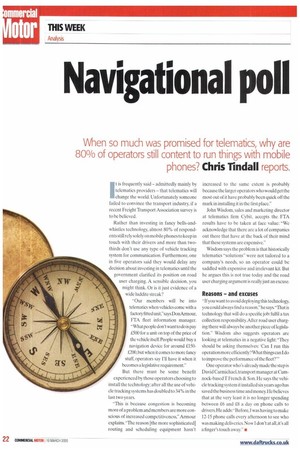Navigational poll
Page 22

If you've noticed an error in this article please click here to report it so we can fix it.
When so much was promised for telematics, why are 80% of operators still content to run things with mobile
phones? Chris Tindall reports.
It is frequently said — admittedly mainly by telematics providers — that telematics will change the world. Unfortunately someone failed to convince the transport industry, if a recent Freight Transport Association survey is to be believed.
Rather than investing in fancy bells-andwhistles technology, almost 80% of respondents still rely solely on mobile phones to keep in touch with their drivers and more than twothirds don't use any type of vehicle tracking system for communication. Furthermore, one in five operators said they would delay any decision about investing in telematics until the government clarified its position on road user charging. A sensible decision, you might think. Or is it just evidence of a wide luddite streak?
"Our members will be into telematics when vehicles come with a factory fitted uniCsays DonArmour, FTA fleet information manager. "What people don't want to do is pay £500 for a unit on top of the price of the vehicle itself. People would buy a navigation device for around £150 £200, but when it comes to more fancy stuff, operators say I'll have it when it becomes a legislative requirement."
But there must be some benefit experienced by those operators choosing to install the technology; after all the use of vehicle tracking systems has doubled to 34% in the last two years.
-This is because congestion is becoming more of a problem and members are more conscious of increased competitiveness," Armour explains. -The reason [the more sophisticated] routing and scheduling equipment hasn't increased to the same extent is probably because the larger operators who would get the most out of it have probably been quick off the mark in installing it in the first place.
John Wisdom, sales and marketing director at telematics firm Cybit. accepts the FTA results have to be taken at face value: "We acknowledge that there are a lot of companies out there that have at the back of their mind that these systems are expensive."
Wisdom says the problem is that historically telematics "solutions" were not tailored to a company's needs. so an operator could be saddled with expensive and irrelevant kit. But he argues this is not true today and the road user charging argument is really just an excuse.
Reasons — and excuses -If you want to avoid deploying this technology, you could always find a reason," he says."That is technology that will do a specific job: fulfil a tax collection responsibility. After road user charging there will always be another piece of legislation." Wisdom also suggests operators are looking at telematics in a negative light: -They should be asking themselves: 'Can I run this operation more efficiently? What things can I do to improve the performance of the fleet?"
One operator who's already made the step is David Carmichael,transport manager at Cumnock-based T French & Son. He says the vehicle tracking system it installed six years ago has saved the business time and money.He believes that at the very least it is no longer spending between £6 and £8 a day on phone calls to drivers. He adds: "Before, I was having to make 12-15 phone calls every afternoon to see who was making deliveries. Now I don't at all, it's all a finger's touch away." •










































































































































































































